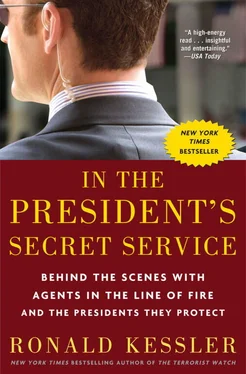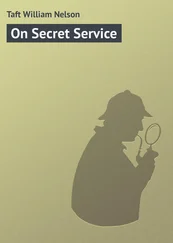Despite these disgusting but isolated problems, the proportion of black agents in the service is 17 percent, much higher than the 12 percent of blacks in the rest of the population. An independent analyst found that for each year from 1991 to 2005, African American agents were promoted to senior pay grades more quickly than white agents. In fact, 25 percent of supervisors belong to ethnic minorities. Since 2001, three black agents—Keith Prewitt, Danny Spriggs, and Larry Cockell—have served as deputy director, the number-two spot.
“The service is very sensitive to the diversity issue, and the statistics and appointments to top posts demonstrate that,” Spriggs says.
Growing up in Detroit, “I never could have imagined that I would one day be with the president in his limousine, in the White House every day, and riding on Air Force One,” says Reginald Ball, a black agent who became a supervisor.
Ironically, several racist emails uncovered by the lawsuit had been sent by Reginald Moore, the plaintiff who is alleging discrimination by the agency. One email sent by Moore contained a joke about a black woman hitting her daughter.
Despite these facts, the Secret Service has overreacted by promoting a few black agents to high-ranking positions even though they are not generally thought to be up to the job. While other black agents are among the agency’s best, reverse discrimination does a disservice to everyone in the organization and to the people agents protect.
30

Dereliction of Duty
WHEN ONE CONSIDERS how important to our democracy preventing an assassination is, the amount spent on the Secret Service—$1.4 billion a year, nearly two thirds of it for protection—seems like a misprint. Indeed, while the agency’s budget increased substantially after 9/11, since then it has actually decreased, when inflation is taken into account. That does not include supplemental appropriations to cover incremental costs for coverage of campaign and national security events.
This at a time when well-funded terrorists have replaced the lone deranged gunman as the greatest threat to American elected officials and when threats against the president are up 400 percent. Yet rather than ask for substantially more funds from Congress, the Secret Service assures members that the agency is fulfilling its job with the modest increases it requests, even as it takes on more duties and sleep-deprived agents work almost around the clock.
Inevitably, when asked if the Secret Service needs more money, Director Sullivan makes a comparison with challenges faced by soldiers in Iraq.
“Let’s face it,” he says. “Everybody would like to have more money in their budget. I was looking at my budget, and I was saying, ‘Boy I would love to have this or have that.’ Then in thinking of all the sacrifice that all of us have to do—I mean we’re in the middle of two wars now—and I looked at the front page of The Washington Post one day, and I saw several marines going to bed that night. They were going to bed on a concrete floor with like a foam cushion maybe an inch thick for a mattress.”
These men, he says, are fighting for our country, not knowing “when they wake up tomorrow morning and go through their day if they’re going to be alive to go to bed again.”
In contrast to soldiers in Iraq, “We don’t have it bad at all,” Sullivan says. “And everybody has to do their part. And I think I owe it to them. I think this whole organization owes it to the people that pay our salary, to be just as efficient and effective and be as good a steward of the government resources as we can. And I think we are.”
Sullivan’s effort to compare Secret Service agents with twenty-two-year-old soldiers in Iraq shows how out of touch with reality Secret Service management is. In contrast to soldiers serving in Iraq, veteran Secret Service agents are being offered up to four times their salary by the private sector to leave the agency.
One director who understood this was Brian Stafford, who headed the agency from 1999 to 2003. Because Stafford perceived the problems, the Secret Service’s budget, even before the 9/11 attack, rose by as much as 25 percent a year after adjustment for inflation.
“When I became director, one of the first things I did was pick the brains of the special agents in charge of each field office,” Stafford tells me. “What I learned was we had quality-of-life issues and an attrition rate that was going up. It wasn’t because agents weren’t passionate about their jobs. It was because they didn’t have a life.”
With the budget increases, Stafford hired another thousand agents.
“The overtime was way too high,” he says. “We were working people too hard.”
Today while the Secret Service fosters conditions that lead experienced agents to resign, it compromises the security of the president, vice president, and presidential candidates by not assigning enough agents to screen everyone with magnetometers. Under pressure from politicians’ staffs, it allows people to enter events without having been screened.
Yet ironically, when Secret Service spokesman Eric Zahren defended the agency’s performance when an Iraqi journalist threw his shoes at President Bush at a Baghdad news conference in December 2008, he pointed out that everyone had been screened with magnetometers. Thus, he said, while shoes were thrown, no weapons were brought into the room, so the president’s life was not in jeopardy.
To be sure, as that embarrassing spectacle illustrates, so long as presidents insist on seeing the public, the Secret Service will not be able to prevent every incident. The tension between letting the president interact with people and protecting him goes back to the earliest days of the presidency. Secret Service agents constantly have to balance the need to protect and the need not to look like the gestapo. But failing to take the most basic precautions is as inexcusable as the decision of the Washington policeman guarding President Lincoln at Ford’s Theatre to wander off for a drink at a nearby saloon.
In the movie In the Line of Fire starring Clint Eastwood as a Secret Service agent, the Secret Service believes an assassin will attempt to kill the president during a planned trip to California. Because it cannot locate the assassin, the agency advises the president’s chief of staff to cancel the trip. Saying the president’s reelection campaign is too important, the chief of staff rejects the advice.
As tension mounts, just before the assassin—played by John Malkovich—is about to shoot the president at a fund-raising dinner on the West Coast, Eastwood lunges for him and is wounded. In effect, he takes a bullet for the president. Yet allowing crowds into an event without screening—as the Secret Service actually does with presidents and presidential candidates—is even more foolhardy and egregious than what the 1993 movie portrays.
Even when the Secret Service could ask for help from other agencies, as when it assigns only three agents to protect a visiting head of state at the U.N. General Assembly, it refuses to do so, rolling the dice on an assassination attempt.
“This is another example of our stubborn leadership saying, ‘We can do this; we don’t need help; we’re the mighty Secret Service,’” an agent who was assigned to the U.N. General Assembly says. “They have this attitude to the detriment of their agents and the well-being and security of the protectees.”
While it scrimps on agents and magnetometers, to impress Congress, the Secret Service wastes taxpayer funds by assigning agents to write reports on thousands of arrests made by local police. Similarly, the agency’s practice of directing agents to ignore violations of law by clearing illegal immigrants to work at the home of the secretary of homeland security, inflating its own arrest statistics by claiming credit for arrests by local police, telling agents to fill in their own physical training test forms, and rigging training exercises to impress members of Congress and U.S. Attorneys fosters a dishonest, corrupting culture that has no place in law enforcement. That culture of deceit conflicts with the inherent honesty of Secret Service agents.
Читать дальше













